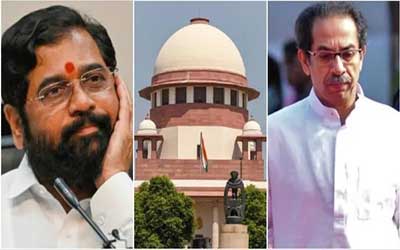Date: 13/05/2023
Relevance: GS-2: Parliament and State Legislatures - Structure, Functioning, Conduct of Business, Powers & Privileges and Issues Arising out of these; Structure, Organization and Functioning of the Executive and the Judiciary; Supreme Court Verdict.
Key Phrases: Supreme Court, Maha Vikas Aghadi (MVA), Anti-defection law, 10th Schedule of Indian Constitution, Governor, Speaker.
Context:
- Recently, the Supreme Court, in a unanimous judgment, ruled that the then Maharashtra governor Bhagat Singh Koshyari’s decision asking the Uddhav Thackeray government for a floor test was “wrong”.
SC Observations and Order:
- The SC observed that the Governor had no objective material on the
basis of which he could doubt the confidence of the incumbent government;
the Floor test cannot be used as a means to settle differences within a
political party.
- The Governor erred in concluding that Mr Thackeray had lost support.
- Therefore, the discretion to call for a floor test is not an unfettered discretion.
- However, the court said that it could not quash the voluntary resignation of Mr. Thackeray was Chief Minister a day ahead of the floor test and thus reinstate his MVA government.
- Given the resignation, the court said that Governor Koshyari was right in then inviting Mr. Shinde to form the new government.
- Besides cautioning Governors against treating internal problems of a
ruling party as a possible loss of majority, the Court has also clarified
that whips and leaders of the party in the House ought to be appointed by
the political party, and not the legislature party.
- This has a bearing on whose whip is binding on legislators in the event of a party splitting into two factions.
Issues in the Judgement:
- It is true that it cannot quash a voluntary resignation, but the
Court fails to acknowledge that his resignation was forced by
circumstances to which the Court itself was a party.
- On the eve of the floor test, a Supreme Court Bench allowed it to go on.
- Earlier, by an interim order, the Court had extended the time given
to the then rebel Shiv Sena MLAs led by Eknath Shinde to reply to
applications seeking their disqualification for defection.
- The order gave ample time to the dissidents to execute political manoeuvres without the threat of disqualification from the House.
- Therefore, in effect, the two court orders helped in the toppling of the regime, a fact that the final verdict fails to acknowledge.
Anti-defection law
- In 1985, the Tenth Schedule of the 52nd amendment to the Constitution of India was passed by the Parliament to limit political defections in India.
- The anti-defection law punishes individual Members of Parliament (MPs)/MLAs for leaving one party for another.
- It also resulted in the introduction of the new word 'Political
Party' in the Constitution of India.
- Thus, political parties got recognition in the Constitution.
- The decision on questions as to disqualification on grounds of
defection is referred to the Chairman or the Speaker of such House,
which is subject to ‘Judicial review’.
- However, the law does not provide a timeframe within which the presiding officer has to decide a defection case.
- Grounds for Defection:
- Voluntary Give Up:
- If an elected member voluntarily gives up his membership of a political party.
- Violation of Instructions:
- If he votes or abstains from voting in such House contrary to any direction issued by his political party or anyone authorized to do so, without obtaining prior permission.
- Elected Member:
- If any independently elected member joins any political party.
- Nominated Member:
- If any nominated member joins any political party after the expiry of six months.
- Voluntary Give Up:
- Merger:
- A 'defection' by two-thirds of the elected members (91st Constitutional Amendment Act 2003) of a political party was considered a 'merger'.
- It allows a group of MP/MLAs to join or merge with another political party without inviting the penalty for defection.
Way Forward:
- For now, the Shinde government seems to be safe because the apex
court refused to interfere with the formation of the current Maharashtra
government, which means that Shinde can continue as the chief minister of
the state.
- The disqualification petitions now lies with the Speaker.
- Mr. Thackeray can now claim a moral victory, but in the domain of political coalitions, a legislative majority is seen as more important than morality.
Conclusion:
- It often happens in litigation around political developments that judgments underscore high principles, but extend no relief to those impacted by breach of constitutional norms.
Source: The Hindu
Mains Question:
Q. What are the major observations and order in the verdict on the Maharashtra political crisis recently delivered by the constitutional bench of the Supreme Court. Also, state the issues arising out of the verdict. (Words 250).






















